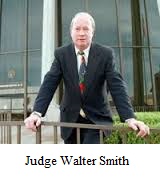Today I sent a letter to Lamar Smith, chairman of the Judiciary Committee of the U.S. House of Representatives, about Judge Ellen S. Huvelle, a U.S. district judge in Washington, D.C. Here’s an excerpt:
…Judge Huvelle knowingly assigned herself to a case that implicated her in a crime, then refused to step aside when I objected to her conflict of interest. Shortly thereafter, she summarily dismissed the case with prejudice and sanctioned me $123,802.17 in retaliation.
You can read the rest of the letter here. As explained in that letter, Judge Huvelle’s escalating misconduct has been brought before the U.S. Court of Appeals for the D.C. Circuit three times. Thus far, the Court of Appeals has taken no action.
I’d really like to know what the connection is between Judge Huvelle and Patrick Kearney, an attorney with Selzer, Gurvitch, Rabin, Wertheimer, Polott, and Obecny, P.C., a firm in Bethesda, Maryland. If the average attorney had done half of the things that Kearney has done in Judge Huvelle’s courtroom, he’d be in prison. Yet she keeps protecting him. Why?
 The addendum to the letter also mentions Walter S. Smith, Jr., a U.S. district judge in Waco, Texas. Did Judge Smith dismiss a federal racketeering suit to protect a state district judge who was his friend? Is the U.S. Court of Appeals for the Fifth Circuit covering up Judge Smith’s longstanding alcohol problems? Did he grope a female courthouse employee while he was drunk? How many trials did he preside over while he was drunk? (One witness told me she saw him drinking at lunch during the Branch Davidian trials). I think the public deserves answers to these questions.
The addendum to the letter also mentions Walter S. Smith, Jr., a U.S. district judge in Waco, Texas. Did Judge Smith dismiss a federal racketeering suit to protect a state district judge who was his friend? Is the U.S. Court of Appeals for the Fifth Circuit covering up Judge Smith’s longstanding alcohol problems? Did he grope a female courthouse employee while he was drunk? How many trials did he preside over while he was drunk? (One witness told me she saw him drinking at lunch during the Branch Davidian trials). I think the public deserves answers to these questions.
While I’d like to think these problems are uncommon, my experience suggests otherwise. Shortly after I began practicing law, I had a case before a federal judge in another state. Some local lawyers told me the judge appeared to be having manic episodes on the bench, so the Court of Appeals quietly put him on leave. After a year, he was put back on the bench, and now he is the chief judge for that district. I’m informed that his moods can still be erratic, leading lawyers to wonder whether he is taking his medication. Who monitors that? I’m all in favor of rehabilitation and privacy, but what about protecting the public?
In the addendum, I also urged Chairman Smith to read two articles that appeared in the Houston Chronicle in 2009, both by Lise Olsen: “Secrecy may help protect misbehaving judges” (Dec. 14, 2009) and “Secrecy of chief federal judges questioned” (Dec. 30, 2009). If the federal judiciary is not willing to police itself, then Congress needs to create an independent oversight organization, perhaps something akin to the Government Accountability Office.
Meanwhile, I might just write a book about the things that lawyers and judges (particularly federal judges) get away with. If you have any tips, send them my way (tyclevenger at yahoo.com). If nothing else, I can blog about it… at least until some federal judge suspends the First Amendment.

I am no attorney by all means but I definitely see where she should have excused herself from this trial and moved to a different judge and different district. Everybody deserves the right to a fair trial. This is our justice system?
If you-know-who gets a second term, the First Amendment will probably be suspended, along with all the others in the Bill of Rights.
Patty that is a silly comment. I expect better of you.
Asinine would be a better word.
Thank you shows a lot of courage in what he is doing, but he is dealing with powerful people in high places. I know Thank you to be very honest and hard working in the interest of justice and the law. I pray that someone out there is paying attention. This is outlandish for such things to take place. But some people will do whatever they think they can get by with. Lindy